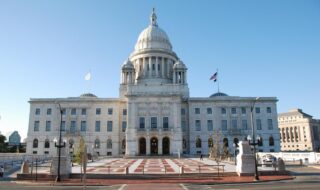March 1, 2024 Last Edit: July 25, 2024
Bills to lower small business taxes, roll back workplace mandates front and center in 2024.
In February, Minnesota lawmakers introduced three bills backed by NFIB. These proposals respond to the growing tax burden facing small employers and the onslaught of workplace mandates passed in 2023.
The Small Employer Payroll Tax Credit (HF 3883) provides a credit against state taxes equal to 10 percent of what a qualifying small business paid in federal social security taxes. Businesses with fewer than 50 employees and less than $25,000,000 in annual revenue qualify for the credit.
With the slew of expensive workplace mandates passed last year like Earned Sick and Paid Family and Medical Leave (PFML), the goal of this proposal is to reduce the financial burden for small employers.
The bill is authored by Rep. Andrew Myers (Tonka Bay) and Rep. Greg Davids (Preston).
A PFML Overhaul (HF 3530/SF 3874) would remake the deeply flawed PFML mandate and significantly reduce the burden for small employers.
Notable proposed changes to the program include:
- making PFML optional for small employers with fewer than 50 employees
- reducing the total number of leave weeks per year from 20 to 12 + 2 for pregnancy complications
- fixing the payroll tax rate at 0.7% and requiring the state to adjust weekly benefit payments to fit under the cap
- define “family” to mean family by eliminating the loophole that allows workers to take up to 12 weeks per year to assist anyone with whom there is an “expectation and reliance” to provide care
- exempt seasonal employees in all industries from the program
While this proposal does not eliminate the PFML mandate, it would reduce the burden and complexity for small business owners. Importantly, the bill would ensure the program remains solvent at a low tax rate rather than letting costs explode and PFML Taxes increase year after year.
In the Minnesota House, this proposal is authored by Rep. Dave Baker (Willmar), Rep. Isaac Schultz (Elmdale Township), Rep. Deb Kiel (Crookston), Rep. Tim O’Driscoll (Sartell), Rep. Patricia Mueller (Austin), Rep. Krista Knudsen (Lake Shore), Rep. Natalie Zeleznikar (Fredenberg Township), and Rep. John Burkel (Badger).
In the Minnesota Senate, Sen. Julia Coleman (Waconia), Sen. Eric Pratt (Prior Lake), Sen. Andrew Lang (Olivia), and Sen. Karin Housley (Stillwater).*
NFIB also supports HF 3313/SF 3335, which would make PFML voluntary and privately-run for all employers. Rep. Baker and Sen. Pratt are the lead authors on this proposal. It has backing from 25 additional members in the Minnesota House and Sen. Coleman and Sen. Jordan Rasmusson (Fergus Falls) in the Minnesota Senate.*
*Minnesota Senate rules impose a limit of five authors per bill.
An Earned Sick and Safe Time (HF 4462/SF TBD) fix-it bill would also reduce the burden on small employers. The ESST Mandate passed last year is one of the most burdensome versions of this law passed anywhere in the country. It even goes further than similar local ordinances in Minneapolis, Duluth, and Bloomington!
The ESST fix-it bill would, among other changes:
- allow small employers with fewer than 25 employees to pay ESST hours at half the employee’s regular rate
- modify covered employment to exclude relatives of an owner, minors under 18, irregular workers, part-time workers, and seasonal workers
- allow employers to impose a 90-day waiting period before new employees can use ESST
- allow employers to withhold ESST payment when employees do not comply with notice or documentation requirements
These changes would provide some balance to the badly skewed ESST law and enable employers to prevent abuse of ESST.
The bill is authored by Rep. Isaac Schultz (Elmdale Township) and co-sponsored by Rep. Lisa Demuth (Cold Spring), Rep. Baker, Rep. Joe McDonald (Delano), Rep. Tim O’Driscoll (Sartell), Rep. Marion Rarick (Maple Lake), Rep. Bobbie Harder (Henderson), Rep. Bernie Perryman (St. Augusta), and Rep. Jeff Dotseth (Kettle River).
NFIB is a member-driven organization advocating on behalf of small and independent businesses nationwide.
Related Articles














